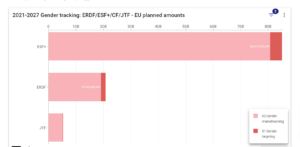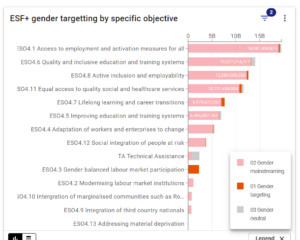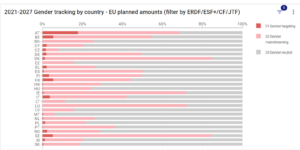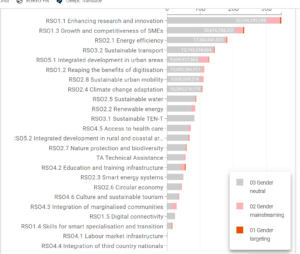On the occassion of the 2023 International Women’s Day, DG REGIO releases a Data Story that shows the potential of Cohesion Policy to support and promote gender equality, including of Roma.
Context
Over 30% (EUR 110 billion) of all cohesion policy investments (incl. the Just Transition Fund) will support gender equality in the 2021-2027 period, either through direct gender equality measures or gender mainstreaming.
Gender equality is not only a question of fundamental rights, of equal opportunities and a prerequisite for democracy – it is also necessary for sustainable economic development. The empowerment of women in the economy can accelerate progress in the less developed regions, as well as more sustainable long-term social and economic development. For example, improvements in social infrastructure reduce at least 3 significant barriers reinforcing gender inequality, such as:
- women’s lack of free time due to the unequal distribution of caring responsibilities and disproportionate burden of unpaid work
- women’s exclusion from many local economic opportunities
- women’s lesser presence or absence from well-resourced networks and important decision-making arenas
Investing in the gender dimension of all EU policies has gained further importance, especially due to the COVID pandemic.
Framework
In addition, the ESF+ Regulation provides for the obligation of the Member States and the Commission to:
- support specific targeted actions to promote gender equality mainstreamingincrease the participation of women in employment
- support the improvement of work/life balance
- combat the feminisation of poverty and gender discrimination in the labour market, education and training
There are also stronger enabling conditions for funding to ensure there is a supportive environment for cohesion policy investments to be effective and efficient. All Member States are required to have effective mechanisms in place to ensure compliance with the EU Charter of Fundamental Rights, including for gender equality. One of the thematic enabling conditions requires the Member States to put in place a national strategic policy framework for gender equality. Until this enabling condition is fulfilled, the Commission will not reimburse the expenditure declared by the Member States under specific objectives.
When selecting operations, Member States must set and apply criteria and procedures that:
- are non-discriminatory and transparent
- ensure accessibility for persons with disabilities
- ensure gender equality
- take account of the EU Charter of Fundamental Rights
The intensity of support to gender equality varies based on the nature of the different funds

This table presents the contribution of the three funds to gender equality. It distinguishes between gender mainstreaming and gender targeting measures. The total allocation and the thematic areas of each fund play a role in the intensity of the gender equality support.
The targeting or mainstreaming gender equality varies by the specific objectives being pursued
Several objectives of cohesion policy address gender equality with large allocations.
ESF+ measures
 Under the dedicated specific objective of the ESF+, Member States can:
Under the dedicated specific objective of the ESF+, Member States can:
- support the development of work-life balance policies, including in the workplace
- ensure gender-sensitive policies that increase the participation of women in the active labour market
- improve access to affordable and accessible care services (childcare, care for older persons or persons with disabilities etc.)
- tackle gender stereotyping, etc.
Under Policy objective 4 ‘A more social and inclusive Europe’ the ERDF complements these actions with investments in social infrastructure.
ERDF gender targetting by specific objective
The expected support to gender equality varies by country

Member States have screened their cohesion programmes to identify actions with a positive impact on gender equality during the preparation phase. As the actions become more concrete during the implementation phase, funding could be moved from one category to another.
The information above reflects the gender tracking of the planned expenditure in the 2021-2027 programming period. A new requirement in the 2021-2027 Common Provisions Regulation to categorise the funding with impact on gender equality has been introduced for the cohesion policy funds. This reporting system covers shared management programmes under European Regional Development Fund, European Social Fund + and Just Transition Fund and will allow for better monitoring of the investments related to gender equality, both ex-ante at programming stage and ex-post linked to expenditure.
The key characteristics of the CPR gender-related expenditure tracking methodology:
The methodology includes two significant scores, which are assigned to actions that positively contribute towards gender equality and one insignificant score that is assigned to all the remaining actions. The following scores are attributed:
- Score 01 Gender targeting for actions making a targeted positive contribution to gender equality – Interventions whose principal objective is to contribute to gender equality; improving gender equality is the main objective of the intervention, without it the action would probably not exist.
- Score 02 Gender mainstreaming for actions making a positive contribution to gender equality through mainstreaming – Interventions having gender equality as an important and deliberate objective but not as the main reason for the intervention; gender equality is directly or indirectly improved as a side effect of the core actions.
- Score 03 Gender neutral for actions that are gender neutral – interventions that do not target or contribute to gender equality.
The categorisation of the gender equality dimension is done at the level of a specific objective of a programme. Where a certain programme does not appear to contribute to gender equality in its entirety, actions or smaller sections of the programme that might be specifically targeted towards gender equality could be identified.
The financial data on cost of selected operations and declared expenditure will be reported to the Commission 5 times per year. The financial reporting is made by categorisation dimension, thus 5 times per year the amounts linked to gender targeting or mainstreaming actions in cohesion policy programmes will be updated. The Commission will review the received data and will publish the first data on implementation in early 2023.
Reflecting the support of ESF+ to gender equality actions, the Member States are obliged to report, where relevant for the programmes financed by this fund, the indicator data broken down by gender (women, men and non-binary, in accordance with the national law).Capacity building in gender mainstreaming is necessary across all sectors and at local, regional and national level, to bring the necessary progress towards more gender equal societies.


